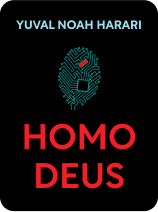

This article is an excerpt from the Shortform book guide to "Homo Deus" by Yuval Noah Harari. Shortform has the world's best summaries and analyses of books you should be reading.
Like this article? Sign up for a free trial here .
Looking for Homo Deus quotes by Yuval Noah Harari? What are some of the most insightful passages that highlight the author’s key ideas about humanity?
In Homo Deus, Yuval Noah Harari maps out the future of humanity, drawing from the interdisciplinary synthesis of history, psychology, economics, and biology. The following Homo Deus quotes highlight some of his ideas about the current state of humanity and what the future holds in store.
Keep reading for quotes from Homo Deus by Yuval Harari.
Homo Deus: Quotes and Passages to Ponder
“In pursuit of health, happiness and power, humans will gradually change first one of their features and then another, and another, until they will no longer be human.”
In discussing the future of mankind, Harari makes a point that it’s unlikely that Sapiens is our final form. He projects that humans will eventually change their makeup by gradually adding desirable features and eliminating undesirable traits until they are no longer human.
“In essence, terrorism is a show. Terrorists stage a terrifying spectacle of violence that captures our imagination and makes us feel as if we are sliding back into medieval chaos. Consequently states often feel obliged to react to the theatre of terrorism with a show of security, orchestrating immense displays of force, such as the persecution of entire populations or the invasion of foreign countries. In most cases, this overreaction to terrorism poses a far greater threat to our security than the terrorists themselves.”
According to Harari, terrorism carries no real threat. As the name suggests, terrorism excites terror but it doesn’t have what it takes to inflict real damage. Terrorists are usually people who lack access to real power, using guerrilla warfare tactics to garner attention. They are akin to flies that want to destroy a china shop. They don’t have the ability to destroy the shop on their own, but if they can goad a bull into the china shop, they can rely on the bull to destroy it. For example, Islamic fundamentalists in the Middle East goaded the United States into conflict to destabilize the Middle East and eliminate Saddam Hussein. This allowed them to seize power for themselves and flourish in the aftermath of the conflict.
“Religion is a deal, whereas spirituality is a journey.”
While many people tend to associate religion and spirituality with one another, Harari argues that they actually promote conflicting perspectives:
- Religion is an agreement. Each person fulfills a specific role, and, in return, religion provides answers to the big questions in life. Religion focuses on the group, not the individual.
- Spirituality is a journey. Each person has their own individual experience and searches for their own answers to the big questions in life. Spirituality focuses on the individual, not the group.
With this in mind, spirituality is actually the enemy of religion. Religion requires followers who are willing to adhere to a uniform set of rules, creating large-group cooperation. Spirituality promotes the individual, which destroys the structure necessary for religious unity.
“To attain real happiness, humans need to slow down the pursuit of pleasant sensations, not accelerate it.”
In discussing happiness, Harari argues that permanent happiness is out of reach for humanity at the moment. People experience temporary pleasant sensations, then use the rest of their time trying to recreate those feelings. Ironically, the more temporary pleasantness you feel, the more likely you are to struggle with long-term happiness. As our expectations become inflated, the things that once provided happiness no longer provide the same satisfaction as they once did.
“The glass ceiling of happiness is held in place by two stout pillars, one psychological, the other biological.”
Further, he argues that there are two approaches to achieving happiness: psychology and biochemistry:
1) Psychology: Human happiness depends on personal expectation. Different experiences and lifestyles create different levels of expectation and, therefore, different requirements for happiness. For example, if you’ve unwillingly gone for days without food, you would be overjoyed at the sight of a fast-food burger. However, if you’ve been eating at 5-star restaurants for your entire life, that same fast-food burger may disgust you. Different experiences create a different reaction to the same food offering.
2) Biochemistry: Human happiness is the result of chemical reactions. While these internal reactions may be caused by external factors, the human brain is only responding to the chemical reactions occurring in the body. This is why drug use is common in most areas of the world. It creates the chemical responses without the external stimuli. For example, if you play professional baseball and hit a walk-off grand slam to win the World Series, your body would release chemicals that create a particular sensation. However, this same sensation may be experienced by an average person trying the drug ecstasy for the first time. While the external factors are vastly different, the internal chemical responses may be almost the same.
“If you really understand the Theory of Evolution, you understand that there is no soul. This is a terrifying thought, not only to devote Christians and Muslims, but also to many secular people who don’t hold any clear religious dogma, but nevertheless, want to believe that each human possess an eternal, individual essence that remains unchanged throughout life and can survive even death intact.”
A die-hard Darwinist, Harari takes an evolutionist stance on the essence of a human being, arguing that the existence of the soul has no place in the realm of the evolutionary theory. Evolution implies that humans are changing all the time and aren’t capable of eternal characteristics. They’re made up of ever-evolving parts that interconnect with the rest of the body.
For example, the human eye consists of dozens of separate, intricate parts that have developed over thousands of years. Each part can be traced back through time to create an idea of how the eyeball evolved. The development of the eye can also, then, be connected to the evolution of the human body and the way that human senses have changed throughout history.
If the soul has no parts, isn’t connected to the physical body, and doesn’t change, it didn’t develop as a result of human evolution. Therefore, the likelihood of its existence is slim to none. Some claim that the human soul just “appeared” one day, but that creates a litany of other questions:
- Who was the first person with a soul?
- Were they born with it?
- If so, how did a baby suddenly develop a soul when neither of its parents had any evidence of one?
- If not, who gave the baby a soul?
If the soul has no parts, isn’t connected to the physical body, and doesn’t change, it didn’t develop as a result of human evolution. Therefore, the likelihood of its existence is slim to none. Some claim that the human soul just “appeared” one day, but that creates a litany of other questions:

———End of Preview———
Like what you just read? Read the rest of the world's best book summary and analysis of Yuval Noah Harari's "Homo Deus" at Shortform .
Here's what you'll find in our full Homo Deus summary :
- Why technology is replacing humanist ideals
- How previous generations relied on prayer to deal with serious problems
- How AI and algorithms are going to run the world






